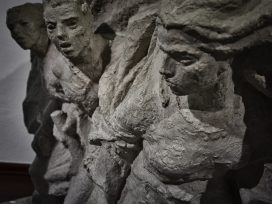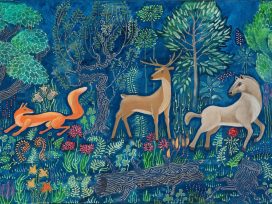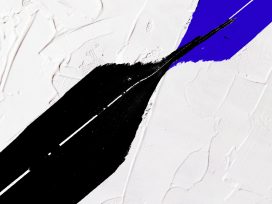Dear Carl Henrik,
I attended a demonstration yesterday outside the Russian consulate in Gothenburg. There were some twenty Georgians with candles and icons, and I had a profound experience of powerlessness. A lot of time has passed since 1992 and the meeting in Gothenburg and Gerlesborg on the west coast of Sweden.
And despite the fact that we wrote in
Ord&Bild in the early 1990s about the “death of liberalism” and “central Europe” and the opportunities that had been lost to build a new Europe, I would assert that we were just paying lip service to pessimism then.
We – and therefore the magazine conferences – were pervaded by a very odd sense of happiness that the liberal ideas to which none of us had actually advocated were now starting to bear fruit. The international that we wanted to join was called Lettre Internationale. On the other hand, if criticism had any place, it was with us. The magazine conferences, like the collaboration with Bourdieu’s Liber, strengthened Ord&Bild, which celebrated its hundredth anniversary in 1992 and needed a suitable event.
Some 30 magazines came to Sweden in 1992. At the forefront were chastened enthusiasts, Olivier Corpet and his friends from IMEC, Oxenius from WDR, Lothar Baier from Freibeuter, Walter Famler from Wespennest and Jani Virk from Literatura. Virk came in a little car from Ljubljana and stayed for a day, only to drive home without seeming to think that it was particularly arduous compared to putting together a good magazine. The meeting was what a spontaneous encounter between well-organized people can be: interesting.
And I’m not talking about romanticism, nocturnal swimming or the difficulty of living out in nature that our Parisian friends had (that was before they moved to Normandy). Nor I am referring to the excursion in the archipelago that we took one night with a captain who speculated about local history and his life as a sailor “before the Wall fell”, a life that he claimed had something to do with the origins or activities of our delegates. Yes, that mysterious captain was a kind of editor and we were his co-authors and subjects.
When Sergei Yakovlev from Strannik in Moscow climbed onboard, the captain said: “Yes, we went in there in Riga once in the sixties, and there were fireworks because it was Lenin’s birthday and then we shot up a plastic bag of acetylene that exploded, and five minutes hadn’t passed before the KGB came onboard and asked us in Swedish if we had seen anything.” Anna Rotkirch from Ny Tid in Helsinki was the next chapter: “During the war, we were paid to take onboard Finnish soldiers. So one day we pulled in one whose name was Nurmi. One day Nurmi sat on deck and then a big wave came and I saw Nurmi’s leg disappear. That was one of those vacuum prostheses that came during the war…” The captain absolutely wanted to appoint George Blecher from New York, who was without a magazine as always but was a diligent participant in the magazine conferences, as an Indian just in order to tell us how he and Nurmi had gone ashore in Bombay to drink “jungle juice”. Nurmi got so drunk that the captain had to drag him back, and then they were followed by robbers. Nurmi’s vacuum prosthesis came loose again and the criminals disappeared, frightened by the presumably leprous Finn. And so it continued. I believe that every minute was used for meaningful, unofficial sharing. Everybody got their story. Ord&Bild survived.
When I later ended up in Moscow, it occurred to me that if the European magazine group had worked so well for Ord&Bild, I might as well try and see if it could have the same effect on Russia – as conservative and reluctant to change as any cultural magazine.
It didn’t. But the network met there in 1997 under the protection of the Swedish and Lithuanian embassies at the premises that had been occupied by the Lithuanian symbolist and translator, and later Lithuania’s ambassador in Moscow, Yurgis Baltrushaitis. The Lithuanian Baltrushaitis translated the Swede Strindberg from German to Russian in Moscow: in his way, he was also emblematic for European cultural magazines. And as Märt Väljataga from the Estonian journal Vikerkaar had entered the European magazine world through Gothenburg and Gerlesborg, new and meaningful partners appeared: Novoe Literaturnoe Obozrenie (New literary review) – with its dynamic editor Irina Prokhorova, and what would later be Neprikosnovennyj zapas (Private stock) – two of Russia’s best magazines.
During the conference with the Lithuanians in Moscow and in the old Swedish house that I then occupied in central Moscow, a stone’s throw from Tolstoy’s “city estate” at the “Virgin’s Field”, and when you Carl Henrik showed up as a representative of Ord&Bild, parts of what would later be Eurozine were negotiated. At least I think it was that way. Moscow subsequently changed for the worse, and now we must demonstrate again, and Eurozine is becoming more important than ever.
Gothenburg, 12 August 2008






